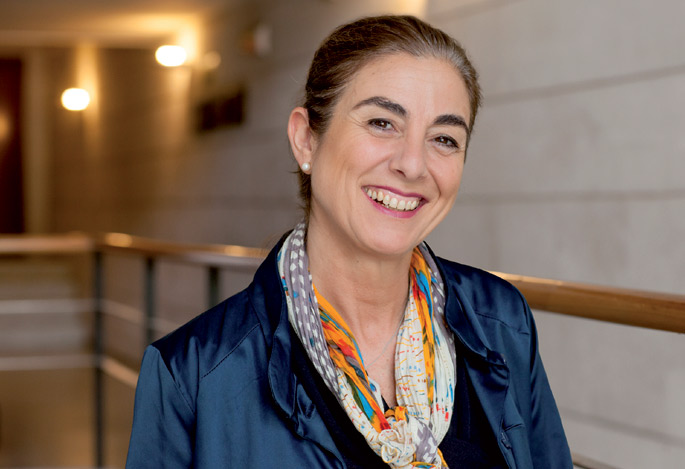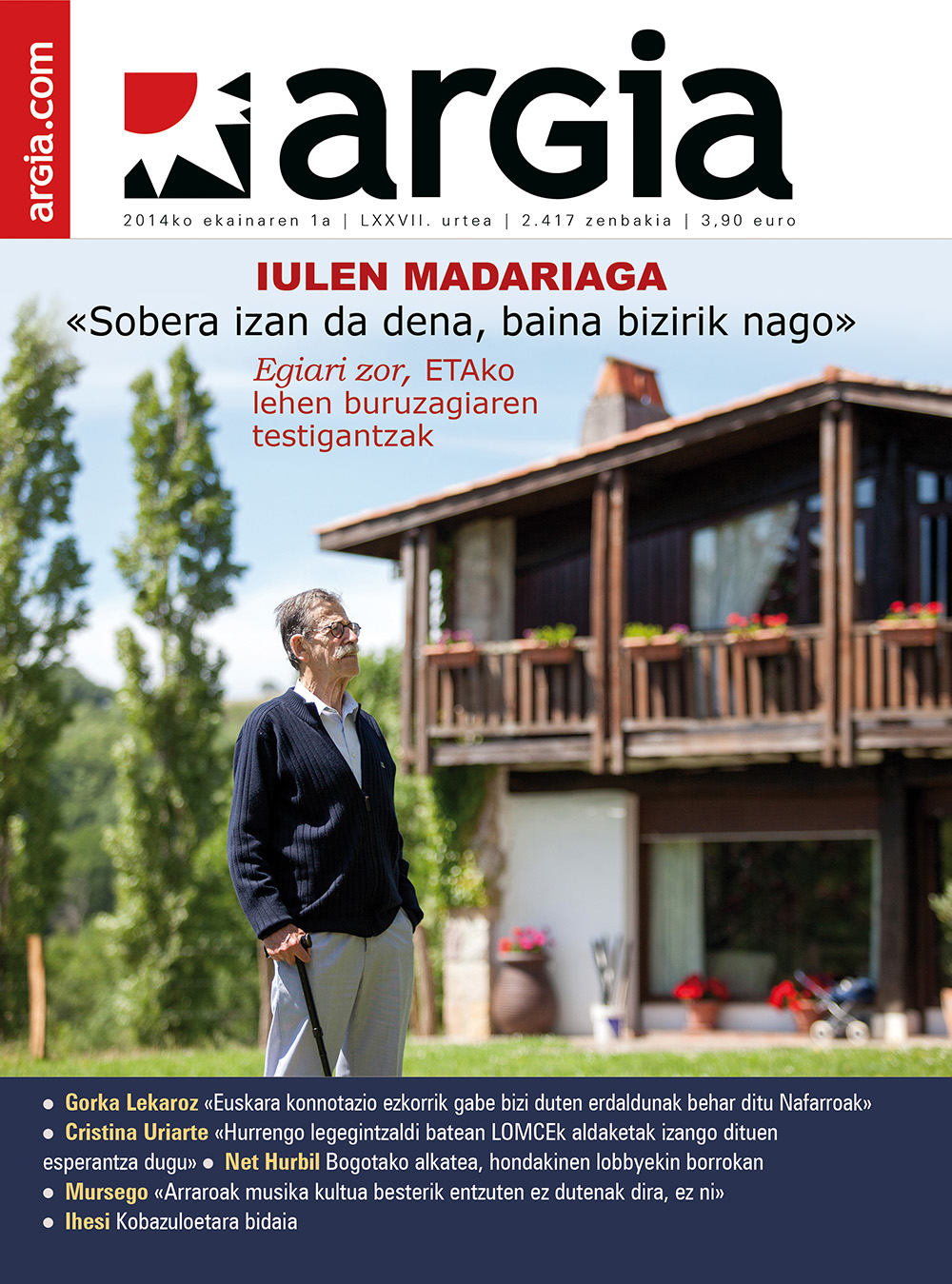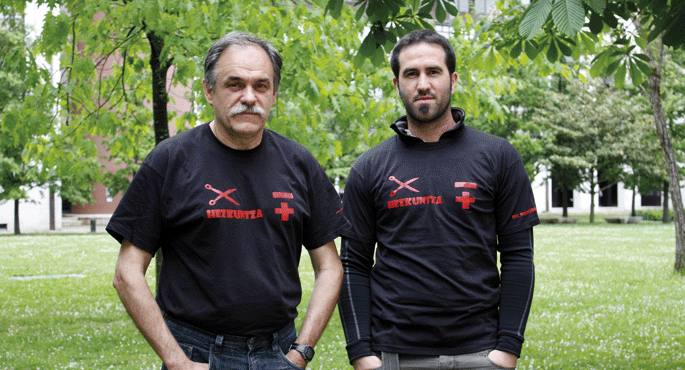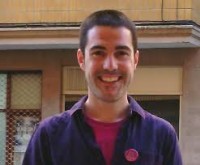"If we've been able to develop our resume with previous laws, we'll do it this time."
- On the eve of the festivities of the Basque Public School, we asked the Minister of Education, Linguistic Policy and Culture of the Basque Government, Cristina Uriarte (Hondarribia, 1961), about the consequences of disobedience, infrastructures, linguistic models, the haurreskola, the university...

Several schools have denounced the lack of investment in infrastructure in the sector. In these times of crisis, what are the priorities of Education in economic terms?
What affects the students and teachers is a priority: the training, the projects we have in place… The infrastructures are very important, but we have put them in a second line, because we have preferred to protect the other; our motto is “personal objective”, and our priority has been to maintain the conditions of the teachers and the students, ratios, etc.
Consideration is being given to the payment of Haurreskola tuition by parents on the basis of income. Is it a step towards the free provision of childcare schools demanded by the trade unions?
At the current economic juncture, our commitment has been to help families maintain early childhood education, adapting the rates according to their situation. That is the way forward in the State and in Europe, and we will reflect on whether we can do so. Gratuity, however, is not on the table, because it is not a compulsory education, and in other places it is not free.
To develop the Basque curriculum, Heziberri 2020 is underway in collaboration with different actors. Do you think that you will reach a sufficient consensus?
Heziberri is a plan based on three plans or steps. We have finished the first and consensus has been reached between the concerted and public actors: we have established the framework of our pedagogical model, the output profile of the students and the methodologies that will be used. We have all put together the main lines to know where we want to go. Competencies have been taken as a basis, the importance of evaluations, teacher training, language, materials, diversity, equity has been underlined... Now we have to prepare the decrees of that curriculum for the next course. We have already launched this process, in which many actors are involved, and we also want to seek the consensus of the social and political players. We want to take Heziberri out, but we want to come out with a broad consensus, and we know that there are different criteria, but we'll act as an intermediary to decide what kind of students we want in the future between all and all. The third step is the law: some want it before, others later, but a law is needed to provide a framework for the pedagogical model and decrees, and that will also have to be agreed. So far everyone has been involved, giving their opinion and making contributions, and we are doing a very nice job. Will consensus on some issues be easier than on others? Perhaps yes, but we all have the same objective: to draw decrees, on a compulsory basis.
It is precisely the students themselves who have criticised the fact that the first meeting in Heziberri was not attended by a representative of the students. They have complained that decisions addressed to students are taken without regard to their opinion.
So we did three projects or steps within Heziberri. The first project was very pedagogical, so we saw that we had to work at a pedagogical level, especially in the centers and in the teachers. The second and third draft will create rules (decrees and law) in which everyone is invited to participate.
But the Abertzales Students say that there are not enough representatives in college and college councils.
At the University Council I believe that they have their participation and influence…
51% of the UPV/EHU Council is composed of teachers…
Yes, but you have to measure what each organ serves. There are students, and I think they do an important job. Do they need more participation? In the case of the University it is a decision of its scope and is similar in all places. And in the school board, there have also been the representatives of the students. At least in this time I have been a counselor I have not received any complaints, saying that they do not feel represented.
Heziberri goes ahead, but also LOMCE. Many actors have not understood why the Basque Government has not stood before this law, such as the governments of Catalonia or Andalusia…
But is it true that they have been planted? One thing is declarations and another is what is being done. And on this issue, I meet them on the same sites and they're doing what we're doing, nothing different. The law is making its way and we cannot give up on it, although we are against the law, but we have said it over and over again: within that law we are going to support our education system and we are working to improve it. We have always been consistent with what we have said. And what's more, those governments are asking us what we're doing and looking at us, and they're interested in our work.
In any case, looking at Wert’s attitude, do you think that the negotiations are going to be effective? What are the minorities that are intended to be guaranteed through these negotiations?
I don't have much hope. The LOMCE has many points and we do not agree with many, we have agreed with the Government of Madrid that the linguistic management decree should not be applied in the CAV, but in everything else we have not reached an agreement. That is why we wish to appeal to the Constitutional Court 19 articles of the law. And the minimum guarantees are, above all, the curriculum and the evaluation system, because it is not acceptable that 50% of the curriculum is in the hands of the Government of Madrid and that external evaluations are controlled by themselves. We will also turn to other issues: Vocational training, autonomy of schools, school advice… LOMCE tramples on the competencies that we have had for a long time.
And what does it mean to resort?
Firstly, to say that we do not agree, because it is unconstitutional and because it tramples on our competences. When will it be resolved within three years or eight years? We don't know.
And as it resolves ...
LOMCE should be applied. It's going to cost us the law. Another thing is to get the adaptations of this law, perhaps in the next legislature of the Government of Spain… We know that this law is harder than the previous ones, but if in the previous six we have been able to develop our curriculum, we will continue and believe that we will achieve it.
Could the same happen in Iparralde in CAV? That is, how does Seaska’s curriculum combine with that developed by the center itself, that the centers develop that of Spain and that of the CAV?
It has nothing to do with it. In France it's very centralized, Paris sets the curriculum and then they have their slots to organize the studies, but they don't have the level of autonomy here. Here the Spanish Government is going to introduce the basic subjects and we will have to see how to manage them, but there are methodological options, the system is not so closely linked to Spain, or we are working to ensure that it is not linked.
Is earning time one of the strategies of the Basque Government? It has been said that LOMCE is a law with no future…
I think it's going to be a law that's going to be there for years, and that's why we have to work not only to gain time, but to undertake our own. If we get the law to be suspended, perfect, but I see it difficult. However, the core of the law, the hope that LOMCE will undergo changes in a forthcoming legislature, is the hope that it will change the casings.
Several agents have presented the disobedience guide to LOMCE, which is called "mass disobedience." Will the government support what most schools decide?
It is clear to us that we have to comply with the law and in the face of this disobedience it is up to us to defend the student. If we follow the path of disobedience, what will happen to the student at the end of the course? We have to comply with the law...
But the government is not going to open the dossier to the teachers, right?
… They will also have to think about what they are doing. We have to get everyone to be in the same place and get the student to get it right.
LOMCE also aims to bring Vocational Training into value. The CAV has prestige and wants to implement a new model.
Yes, as we are doing in Heziberri, we are also preparing the curriculum for Vocational Training for the next course. We are working on the fourth Vocational Training Plan and on a new law. An example of this level is the Professional Training Congress that we will be holding in Donostia from 28 to 30 May. It will be very powerful and will be attended by representatives of 42 states, including the Obama advisers who will be present.
At the university, students denounce that tuition fees have risen with Bologna, that graduate students are very expensive and that scholarships have been reduced.
That is not true. Tuition fees have risen only to the annual CPI. And some conditions have changed, but scholarships have stayed.
UPV/EHU Rector Iñaki Goirizelaia recently stated that cuts in university funding and investment will have "very serious consequences".
Compared to last year, the budget earmarked for the university has increased this year by EUR 12 million. What would you expect to see a bigger increase in your forecasts? Perhaps yes, but given the situation we are in, we have extended the game last year. The situation is not easy for anyone, and if there are “serious consequences”, it is not because the government has put little money, the university has more funding, and elsewhere it will also have problems. However, compared to other places, the situation is not so bad, it is up to us to adapt it. Serious situation? Yes, if they're more severe.
SEASKA criticised in Herri Urrats that in the last three years it has received very few subsidies from the Basque Government: EUR 400,000 to be distributed among 60 Iparralde associations.
Yeah, and most of it goes to Seaska. Since we entered into this agreement, we have made a great effort, and the amount we put is important, because the situation does not help us.
Recently, the results of the 2013 General Diagnostic Evaluation have been published. He has argued that the use of the new support has worsened the results, but in Spanish the students have improved and in Basque and mathematics have worsened. A third of 10-year-old students have not reached the minimum level of Euskera…
We were surprised by these results and, finding out what has happened, we realized that, as you say, the support has been different and that has influenced; they are incomparable with the previous results, the conditions and contents of the study have to be adapted. But in the results of PISA, for example, we've seen that there are no big changes compared to the previous ones.
Isn't Euskera worrying?
But what about Euskera in general is worrying and what about V. We've also seen it on the Sociolinguistic map. The school has helped a lot to drive Euskera, but we need to talk, use it, and that's not just achieved in school. It is true that we have seen that the more hours it takes in Basque at school, the results are better, and we have to continue down that road.
The trilingual project established by Celaá is suspended and aims to return to the pattern of linguistic models.
The trilingual project has been an experience that has ended, it has not been cancelled. In view of the good results achieved, we are currently working on the subject of languages at Heziberri. In the meantime, we are putting in place measures to maintain the effort made so far, with the provision of aid for teacher training. We are in favour of promoting multilingual projects, but we do not agree that, as the trilinguist said, at least 20% of the classes are in Spanish.
However, as already specified in Heziberri, the intention is to maintain models A, B and D, and Euskera as the main axis.
That's the basis. The Law of the Basque Country says that the right of families to choose the language must be guaranteed, because we have two official languages, and that is why we maintain the three models, but from there we want to promote the Basque Country, and we have proposed to include the Basque language a little more in the centers of Model A, which is what the law allows us.
Would model B also be modified?
Model B does not need to be adapted, as it allows for great flexibility for the center itself to introduce more or less Basque, Spanish or English. What we say about model B is that if more English comes in, it's not to take away the Basque.
You have launched an interesting Master Plan to work on co-education and prevention of gender-based violence.
Work is under way in 50 centres and 100, 50 public and 50 concerted schools are planned for the next course. It is working very well, the teachers are very involved and the demand has been tremendous from the very beginning.
The Minimum Agreement between political parties is a request that comes from a long way to ensure the stability of education.
We at Heziberri are working on that. In the State seven educational laws have been drawn, but in the Basque Country we have always achieved stability, because we work with a broad consensus, with education and with the social agents. And with Heziberri, we also want to address that: if we have achieved a consensus when it comes to defining what the curriculum is, we have to reach a consensus, and we will work towards it, to get a law. The law is to be achieved with an agreement between the parties and we know that it will not be easy, but we all have the same goal: to work for our educational system.
Murgian ospatuko den Euskal Eskola Publikoaren jai atarian, hezkuntza arloko murrizketen aurka eta LOMCE lege-proposamenaren kontra borrokan diharduten bi elkartetako ordezkariekin bildu gara, Hezkuntzan Geu Eragileko Edu Zabala eta Denon Hezkuntzako Aitor Otañorekin... [+]
San Ignacion, Luis Elejalden, Aresketan… planto egin diote LH 6. mailako kanpo ebaluazioari. Hezkuntza Plataformen Topagunetik kalifikazio sistema “inposatu” honi planto egiteko deia luzatu zuten eta elkarlanean ari dira ikasleak, irakasleak eta... [+]
Luis Dorao, San Martin, Lukas Rei, Barandiaran, Umandi… Arabako 27 ikastetxe hauetatik 19 publikoetan egin nahi ditu frogak Eusko Jaurlaritzak martxoaren 5etik aurrera Lehen Hezkuntzako 6. mailako ikasgeletan. DBHn ere Pisa azterketa egitera deituko dituzte 4. mailako... [+]
We have recently seen the worrying results of Basque education. Recently, the PISA (International Student Assessment Programs) report gave us the first slap, as our students got very poor results. Because we were led to believe that from the Basque Government the teaching here... [+]
Ebaluaketak "merkatu eta politika neoliberalen menpe" daudela kritikatu du sindikatuak eta proba "jarraitu eta hezigarrien" aldeko dokumentua aurkeztu du.
Hezkuntza arloan bero bukatu zen ikasturtea EAEn eta indartsu ekingo diete berriz murrizketen aurkako mobilizazioei: abendura bitartean, greba orokorra eta arloz arlokoa, itxialdiak, elkarretaratzeak, solasaldirako tarteak, salaketa egunak, borroka asteak eta manifestazioak... [+]

























